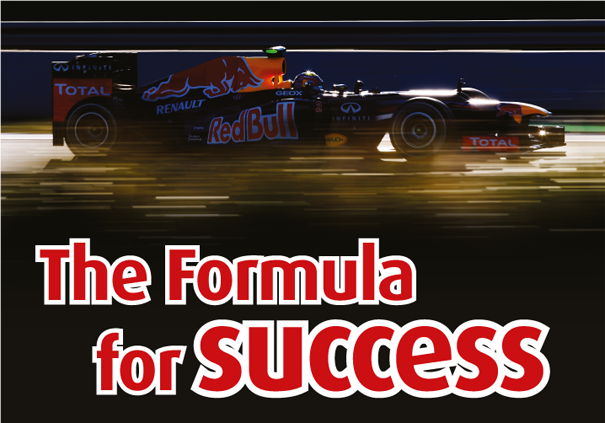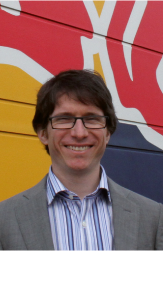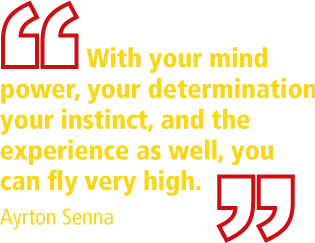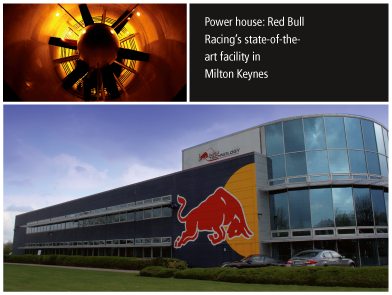
Think you’ve got the horsepower to make a living alongside the likes of Sebastian Vettel? Then read on for an insight into what it takes.
BY Joe Hibbert
 When the Editor requested an article featuring a man who’s got more poke than a Ferrari and more overtaking manoeuvres than Jenson Button, to feature in this maiden issue of Moving On magazine, I looked no further than my own flesh and blood in the form of Matthew Hibbert, Design & Development Office Manager at Red Bull Racing in Milton Keynes.
When the Editor requested an article featuring a man who’s got more poke than a Ferrari and more overtaking manoeuvres than Jenson Button, to feature in this maiden issue of Moving On magazine, I looked no further than my own flesh and blood in the form of Matthew Hibbert, Design & Development Office Manager at Red Bull Racing in Milton Keynes.
For a man who fits snugly into the glove box of most 1-litre run-arounds his rise through the ranks has been huge. Fresh out of university at 22 with an Honours degree in Engineering he became an Aerodynamics Designer within four years. He’s now a major player in a team which has sent ripples of fear through its F1™ rivals, winning two Drivers’ World Championships and Constructors’ Championships back-to-back in the last two seasons.
Getting there has been no Sunday afternoon cruise – more like a furious sprint to the chequered flag that would make Murray Walker salivate – and see Matthew progress rapidly in his career. I think I’ve massaged his ego enough, so here’s the low-down from the man himself.
![]() What are the career opportunities in F1™
What are the career opportunities in F1™
![]() Within the company I work for there are roles in Research, Aerodynamics, Engineering Design, Manufacturing, Quality, Electronics, Controls Engineering, Vehicle Modelling & Simulation, Health and Safety, Model Making, Mechanics, Transport, Facilities, IT, HR, Finance, Procurement, Marketing, Logistics, Project Planning, Hospitality and catering.
Within the company I work for there are roles in Research, Aerodynamics, Engineering Design, Manufacturing, Quality, Electronics, Controls Engineering, Vehicle Modelling & Simulation, Health and Safety, Model Making, Mechanics, Transport, Facilities, IT, HR, Finance, Procurement, Marketing, Logistics, Project Planning, Hospitality and catering.
Within the sport as a whole there is also Medical, Administration, TV, Radio, and Publishing.
![]() How much travel is involved?
How much travel is involved?
![]() I have what we call a factory-based job and I rarely need to travel. Of course, the sport is international and many of my colleagues need to travel on a weekly basis from January through November. It is a very hectic schedule in F1™ – there are 20 races and four team tests per year – and those who travel have to balance their lives in different ways to the rest of us.
I have what we call a factory-based job and I rarely need to travel. Of course, the sport is international and many of my colleagues need to travel on a weekly basis from January through November. It is a very hectic schedule in F1™ – there are 20 races and four team tests per year – and those who travel have to balance their lives in different ways to the rest of us.
![]() What are the perks of your job?
What are the perks of your job?
![]() Free Red Bull is very nice! There could be a free ticket to the British Grand Prix if the company can afford it and, as Red Bull knows how to host a good event, our end of season parties are pretty special. It’s very rewarding working alongside such driven people too. No matter what role they have here, they all share a will to succeed. That’s the best thing about the job for me.
Free Red Bull is very nice! There could be a free ticket to the British Grand Prix if the company can afford it and, as Red Bull knows how to host a good event, our end of season parties are pretty special. It’s very rewarding working alongside such driven people too. No matter what role they have here, they all share a will to succeed. That’s the best thing about the job for me.
![]()
How is Red Bull run and how does this differ from the previous owner, Jaguar?
![]() Red Bull is great to work for as they have gone out of their way to make the employees’ facilities, such as the canteen and rest area, as relaxing as possible. Furthermore, as a management philosophy we are given our targets but they genuinely let you get on with it and you get the chance to express your ideas. There’s a very good sense of personal responsibility here – and if you succeed then the team succeeds. This runs throughout the organisation and it seems to be stronger than when the company was under previous managements.
Red Bull is great to work for as they have gone out of their way to make the employees’ facilities, such as the canteen and rest area, as relaxing as possible. Furthermore, as a management philosophy we are given our targets but they genuinely let you get on with it and you get the chance to express your ideas. There’s a very good sense of personal responsibility here – and if you succeed then the team succeeds. This runs throughout the organisation and it seems to be stronger than when the company was under previous managements.
![]() Did you plan for this job or did it arise through circumstance?
Did you plan for this job or did it arise through circumstance?
![]() I’ve always been captivated by motor racing and cars. Apparently, the first word I spoke was Bugatti (the famous French car maker) and I would draw cars as a boy, go to the races with my family and make Meccano models.
I’ve always been captivated by motor racing and cars. Apparently, the first word I spoke was Bugatti (the famous French car maker) and I would draw cars as a boy, go to the races with my family and make Meccano models.  Working in Formula 1™ was always something I wanted to do but I didn’t know how to break into the industry. At university I specialised in Mechanical Engineering to gain the skills to be an Engineering Designer. When I finished I secured a Designer position at an aerospace engineering design consultancy in Derby, staying there for two years before leaving for another design consultant role across the city. Two years later, the recruitment side of the first company called and, knowing that I’d jump at the chance, asked if I’d be interesting in joining a Formula 1™ team. I had an interview and the rest as they say, is history.
Working in Formula 1™ was always something I wanted to do but I didn’t know how to break into the industry. At university I specialised in Mechanical Engineering to gain the skills to be an Engineering Designer. When I finished I secured a Designer position at an aerospace engineering design consultancy in Derby, staying there for two years before leaving for another design consultant role across the city. Two years later, the recruitment side of the first company called and, knowing that I’d jump at the chance, asked if I’d be interesting in joining a Formula 1™ team. I had an interview and the rest as they say, is history.
![]()
How hard is it to get a foot in the F1™ door?
![]() It is difficult. You need to have the right temperament, the right skills and be resilient – able to work hard, day in, day out. It’s a bit of a Catch 22; you need to be able to demonstrate those things, however to demonstrate those things you need someone to give you the opportunity to do so. That’s why we increasingly rely on Industrial Placement years where students will come and work with us whilst taking a year out from their degree.
It is difficult. You need to have the right temperament, the right skills and be resilient – able to work hard, day in, day out. It’s a bit of a Catch 22; you need to be able to demonstrate those things, however to demonstrate those things you need someone to give you the opportunity to do so. That’s why we increasingly rely on Industrial Placement years where students will come and work with us whilst taking a year out from their degree.
![]()
Is university a must for people interested in a career in F1™?
![]() For a technical department role it is necessary. However, there are many positions for which a degree is not required but other vocational qualifications would be.
For a technical department role it is necessary. However, there are many positions for which a degree is not required but other vocational qualifications would be.
![]()
What advice can you give undergraduates as to what they can expect from a career in F1™?
![]() You can expect challenge and opportunity. Challenge is something you’ll face every day and to some extent you’ll get out of it what you put in. You can always go the extra mile, adding something more to any request, task or project.
You can expect challenge and opportunity. Challenge is something you’ll face every day and to some extent you’ll get out of it what you put in. You can always go the extra mile, adding something more to any request, task or project.
![]() What’s the most memorable advice you’ve been given in pursuit of your career?
What’s the most memorable advice you’ve been given in pursuit of your career?
![]()
“Play positive politics.” What that means is, if you have a disagreement with someone, always deal with it objectively. Recognise the other person’s point of view and try to understand their motivation. Above all, discuss any issues you have with someone else face-to-face. Better relations will result and mutual respect will grow.
![]() Many young people aren’t aware of the career opportunities available to them such as your role, what advice would you give to these people to help them fulfil their ability?
Many young people aren’t aware of the career opportunities available to them such as your role, what advice would you give to these people to help them fulfil their ability?
![]() It’s about recognising your talents and then identifying opportunities where you can use them. So, if you’re someone who is highly customer-focused then you have probably got the mindset for the hospitality industry as well as a job in retail. Once people make these connections then they have the chance to broaden their horizons.
It’s about recognising your talents and then identifying opportunities where you can use them. So, if you’re someone who is highly customer-focused then you have probably got the mindset for the hospitality industry as well as a job in retail. Once people make these connections then they have the chance to broaden their horizons.
![]()
Since working for Red Bull has there been anything that has changed your mind in what employers look for?
![]() Definitely. Managers still look for skills such as timekeeping and reliability, but actually what I’ve found here is that you need creativity. You could do a job with all the relevant employability skills, but without a spark of creativity you wouldn’t necessarily have the ideas and innovation needed. By nature, kids have a lot of creativity and they should be able to use that.
Definitely. Managers still look for skills such as timekeeping and reliability, but actually what I’ve found here is that you need creativity. You could do a job with all the relevant employability skills, but without a spark of creativity you wouldn’t necessarily have the ideas and innovation needed. By nature, kids have a lot of creativity and they should be able to use that.
![]()
Working in an industry as high pressured as F1™, what advice can you give people about managing their workload?
![]() Don’t go into F1™ if you want to work 9 to 5 or if you want an easy ride: you’ll need to give a lot more if you want to make a real commitment to the team’s success.
Don’t go into F1™ if you want to work 9 to 5 or if you want an easy ride: you’ll need to give a lot more if you want to make a real commitment to the team’s success. If you start a job in F1™, or any other walk of life, be prepared to work hard but also be prepared to discuss your own limits with your manager. A decent manager will take this on board and take some action. They may not be able to fix things overnight, but long term outcomes from such a discussion should be positive for everyone concerned.
If you start a job in F1™, or any other walk of life, be prepared to work hard but also be prepared to discuss your own limits with your manager. A decent manager will take this on board and take some action. They may not be able to fix things overnight, but long term outcomes from such a discussion should be positive for everyone concerned.
![]()
What can we expect from the rest of the
F1™ season?
![]() The usual – fast cars, glamour, technical innovation and politics. The unusual will be that the racing will be closer than in previous years. It should be exciting.
The usual – fast cars, glamour, technical innovation and politics. The unusual will be that the racing will be closer than in previous years. It should be exciting.
 Moving On magazine careers and qualifications
Moving On magazine careers and qualifications




 A New Sparta Group Company
A New Sparta Group Company